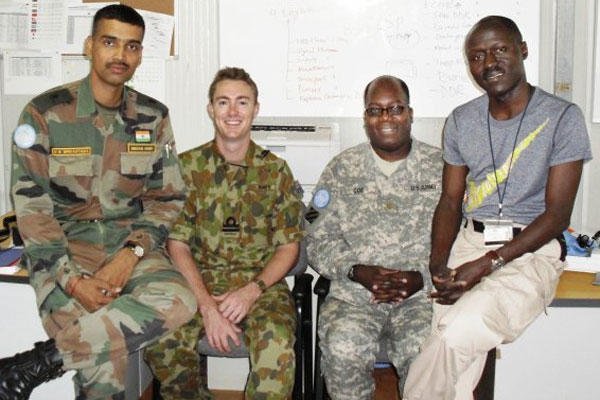Maj. James Coe says living in an environment without roads, bridges, traffic laws, a sanitation system or a power grid isn't as bad as one might think.
Coe, a logistics planner in the Army Contracting Command deputy chief of staff logistics G4, Redstone Arsenal, Ala., deployed to the African nation of South Sudan as part of the United Nations Mission in the Republic of South Sudan, or UNMISS.
According to the U.N. website, the birth of the Republic of South Sudan on July 9, 2011, was the culmination of a six-year peace process that began with the signing of the Comprehensive Peace Agreement in 2005. The mission is to help the nation establish conditions for it to develop.
"It's been a month since my arrival in South Sudan and it's quite interesting and a good assignment," said Coe, a native of Mansfield, Ohio. "South Sudan is exactly what you might expect from an emerging African nation."
Upon his arrival, Coe was not surprised to see a struggling government that had a smaller military and saw an influx of foreign cash and contractors and environmental issues such as land mines from years of civil war.
In the UNMISS Joint Logistics Operations Center Plans section, Coe serves as the unit's logistics plans officer. He says his ACC job and his U.N. position are as different as night and day.
"On the surface, it seems like it would be the exact same thing. The two positions have some similarities and distinct differences," said Coe, a husband and father of four.
"The logistical planning and coordination aspects of each job are similar; however, the logistical support provided to contingency operating bases here is more heavily involved with the construction/engineering of facilities in support of the mission rather than the requisitioning/
accountability of equipment or the distribution of most classes of supply. It's all logistics, but definitely of a different variety of flavor here in South Sudan."
Previous deployments to Kuwait, Qatar and Afghanistan provided Coe with the experience of working in a joint environment and adapting to austere living conditions.
"Working on a U.N. staff is a drastically different experience than most assignments an average Army officer will ever have," Coe said. "It is a truly joint/international experience. Everyone in my
section is from a different nation and either Army, Navy, Air Force or Marine. The cultural and service-specific differences are many so the challenge comes in how to effectively communicate with everyone without offending anyone, or misinterpreting messages or having any misunderstandings."
The language barrier, traditions and customs of numerous nations melting into one organization can sometimes prove very difficult, Coe said, but he relishes the opportunity to overcome any obstacle.
"In this environment a U.S. officer operates independent of U.S. forces," said Coe. "You are truly in the hands of bosses, usually from a nation other than your own, that you work for on the ground. It's a situation that most U.S. troops will never experience."
Work challenges aside, Coe said the deployment has given him the opportunity to visit a place he's dreamed of visiting, but also the chance to help make a big difference.
"I've always wanted to see Africa. Africa, in my mind, represents a great opportunity to help and assist in the development of another culture in need," he said. "As an American of African descent, it also represents the homeland neither I, my parents nor grandparents ever knew.
"I enjoy interacting with the Sudanese people in a lot of ways; experiencing their foods, speaking with them directly about their lives and experiences and observing their growth as a new nation. They are truly a beautiful culture and a very positive, upbeat group of people despite the problems their nation has faced over the years," he said.

























